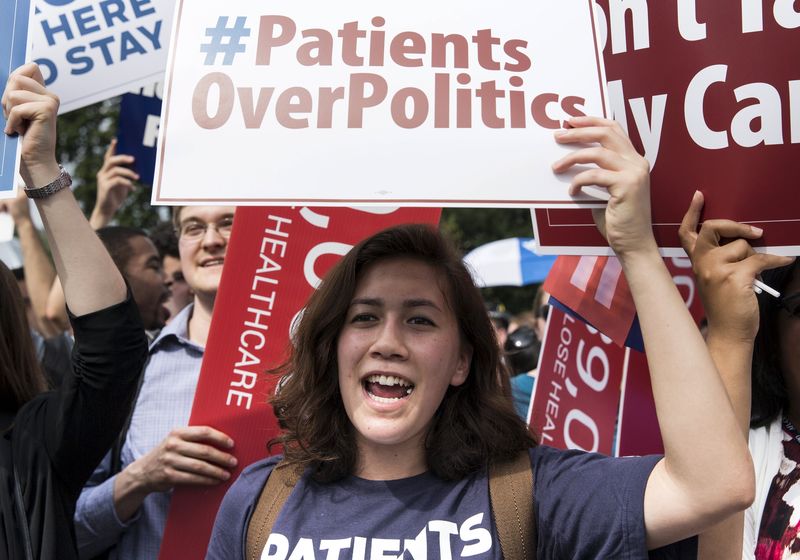By James Oliphant
WASHINGTON (Reuters) - Infuriated by a U.S. Supreme Court ruling that kept President Barack Obama's healthcare program intact, conservative activists and Republican presidential candidates vowed on Thursday to make the role of the high court a central issue in the 2016 presidential election.
Conservative ire was trained particularly on Chief Justice John Roberts, who wrote the majority opinion that preserved the subsidy regime underpinning the Affordable Care Act, even though another Republican appointee, Justice Anthony Kennedy, also voted with the majority.
Roberts, who was appointed to the court by Republican President George W. Bush, has voted with court conservatives on many landmark cases, including ones involving campaign-finance laws and voting rights. But he also enraged opponents of the Affordable Care Act three years ago when he cast a deciding vote in rejecting a different legal challenge to the law.
"He's let down the [conservative] movement," said Curt Levey of the Committee for Justice, which advocates for conservative judicial nominees. "He may feel he has no obligation to the movement."
Some conservatives have been skeptical of Roberts from the start, saying he was maddeningly opaque about his judicial philosophy during his 2005 Senate confirmation hearings. Roberts had spent only about two years as a federal appeals court judge, which meant a sparse paper trail illuminating his judicial philosophy.
In opening remarks during his confirmation hearing before the U.S. Senate judiciary committee in 2005, Roberts spoke neutrally, noting that "Judges are not politicians who can promise to do certain things in exchange for votes" and vowing to "confront every case with an open mind."
"We wanted to be supportive, but there were these nagging doubts," said Carrie Severino, policy director of the conservative Judicial Crisis Network. "You can't assume someone is going to go south, but it appears the concerns were warranted. It's what happens when you nominate someone who doesn't have a clear record."
Levey said that the pressure will now fall on Republican presidential hopefuls to spell out in detail their views on court appointments - and simple generalities about being faithful to the letter of the U.S. Constitution won't cut it.
"It might have been enough before today for presidential candidates to spout the usual things about appointing someone who interprets rather than writes the law. I think you'll have to say more now," he said. "Each candidate will have to do something to show the base how they will avoid appointing another Roberts."
Mark Levin, a frequent critic of the court who heads the conservative Landmark Legal Foundation, said Republican senators, too, will "need to take their responsibility far more seriously and much more aggressively scrutinize these nominees."
Beyond that, Jay Sekulow, a prominent conservative lawyer who has argued a dozen cases before the high court, suggested that the healthcare ruling will prompt a debate on the presidential campaign trail over the justices' proper function. "What the court said that is that if legislation is written poorly, we can fix it," he said. "That's very different from the traditional role of the court."
Indeed, some Republican candidates were scathing Thursday in their assessment of the decision. Mike Huckabee, the former Republican governor of Arkansas, termed it "an out-of-control act of judicial tyranny." Ted Cruz, the senator from Texas, accused the high court of usurping the role of Congress. "Unelected judges have once again become legislators, and bad ones at that," he said.
In that vein, the ruling, along with a decision on the legality of same-sex marriage bans that could come as early as Friday, could hand Republicans a twin-barreled weapon with which to galvanize conservative voters into action. Four years ago, conversely, it was Democrats who made a Supreme Court ruling a centerpiece of their election message, blasting the court's decision in the Citizens United case, which opened the door for massive corporate campaign expenditures.

Obama's successor, whether Republican or Democrat, could play an outsized role in shaping the future of the court, said Severino. "The next president could replace Justice [Ruth Bader] Ginsburg or possibly [Justices] Kennedy and Scalia," she said. "It would be World War III in terms of the amount of influence that president would have."